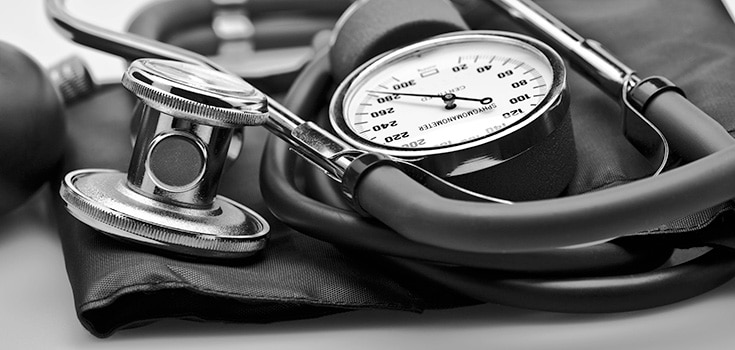High Blood Pressure Could Cause Your Brain to Age Faster

Most of us don’t worry about dementia and cognitive health until later in life. New research from the University of California Davis, however, could change our minds.
Researchers found that young people approaching middle age with high blood pressure—even mild levels for which doctors don’t intervene—experience accelerated brain aging. This could be because high blood pressure makes arteries stiffer over time, raising the risk of cardiovascular disease by 49% and cerebrovascular disease—like ischemic stroke—by 62%. It is, according to Medical News Today, “the single greatest risk factor for premature death in the US, where it affects some 50 million people.”
Senior author Charles DeCarli says in The Lancet that this manner of vascular brain injury, which has been linked to cognitive difficulties like dementia later in life, “develops insidiously over the lifetime with discernible effects.”
High Blood Pressure Ages Brain
In a multi-generational study, DeCarli and his colleagues took data from 579 people across three generations. The most recent participants were largely in their late 30s when they had their blood pressure and then divided into three groups based on their readings: normal, prehypertensive, and high blood pressure. After taking smoking habits, medication, and other variables into consideration, researchers gave participants magnetic resonance imaging (MRI) brain scans to measure extent of brain injuries, if any.
Participants with higher blood pressure showed inferior brain health to those with normal blood pressure. Those with high blood pressure also showed, on average, 9 percent less gray matter in the frontal and temporal lobes than their counterparts in the normal blood pressure group. For instance, a 33-year-old with high blood pressure had a brain aged equally to a 40-year-old’s with normal blood pressure.
“Vascular brain injury may develop insidiously over several decades,” says lead author Pauline Maillard, who also warns that white matter damage can be detected even in our younger years. She calls for “early and optimum control of blood pressure, which is neither routinely achieved nor subject to testing in randomized controlled clinical trials.”
Lower Your Blood Pressure Naturally
High blood pressure and stiffened arteries affects blood flow to both the outer gray matter and inner white matter of the brain, which are both key players in the central nervous system. In addition to a poor diet and exercise regimen, lack of sleep can also raise blood pressure, so play with your schedule to allow for adequate amounts of rest.
If you want to lower blood pressure naturally, you’re in luck; there are many home remedies for high blood pressure that can be found in your own kitchen (or at least at the grocery store).
- Vitamin D improves vascular health and helps naturally lower blood pressure. Just step outside for 15 to 30 minutes without sunscreen to get a good dose of natural—and free!—vitamin D.
- One papaya contains 781 mg of potassium, a mineral and electrolyte that helps control blood pressure. In fact, the American Heart Association recommends we each get 4,700 mg of potassium a day to regulate our blood pressure.
- One study found that watermelon extract supplementation reduces ankle and brachial blood pressure, carotid wave reflection, and overall arterial function. Earlier studies, such as one from Florida State University, found that 4 grams of watermelon extract per day reduced systolic blood pressure
- Coconut water was found to lower the blood pressure of 71% of study participants in one 2005 study.
Additional Sources:
